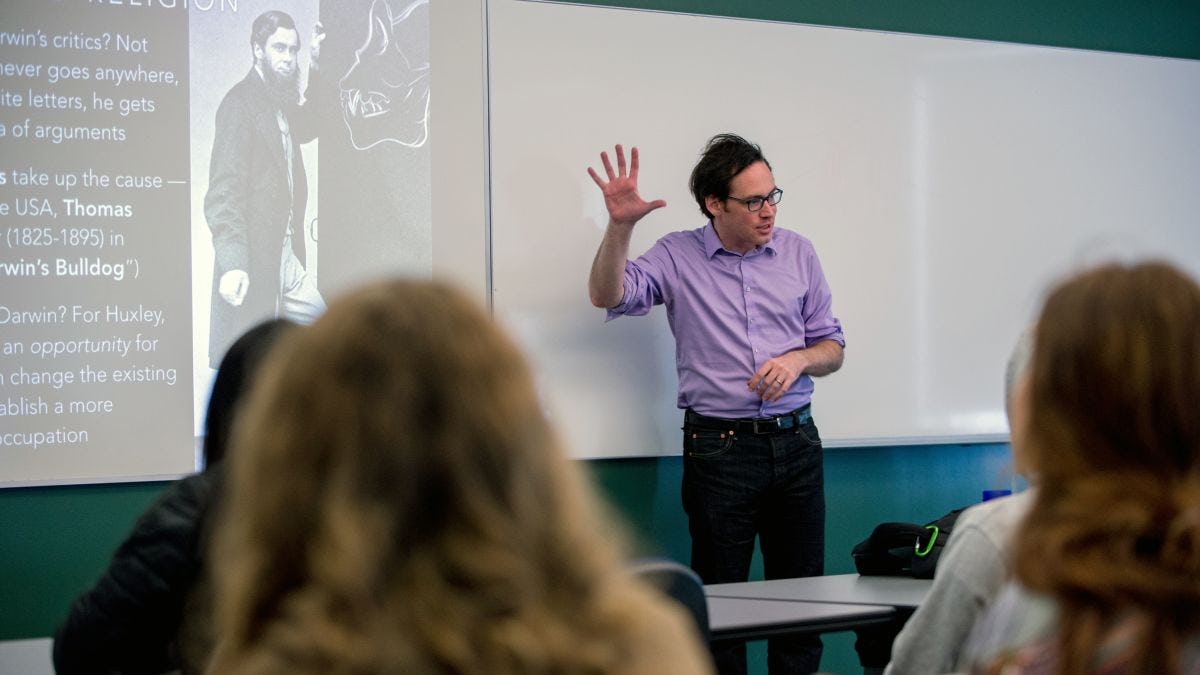
Bachelor's in Science, Technology & Society
Program Details
Degree
Bachelor of ScienceAvailable
On campusSeek Knowledge, Shape the Future
To address global challenges like climate change, public health and artificial intelligence, Stevens’ science, technology and society major challenges students to examine the forces shaping innovation and knowledge.
Housed in the School of Humanities, Arts and Social Sciences, this Bachelor of Science program prepares students to lead in a rapidly changing world. Our graduates thrive across industries, organizations and graduate programs, securing roles in healthcare, research, publishing and beyond.
Catalyze Career Success
By studying scientific debates and case studies, students sharpen their writing, speaking and analytical skills and in turn, learn to convey complex ideas across schools of thought. The curriculum equips students to navigate real-world challenges and setbacks, fostering flexibility and sharpening problem-solving skills.
Professional Outcomes
Graduates develop a practice of asking critical questions and gain a clear perspective on issues at the intersection of innovation, ethics and globalism. This insight and expertise is precisely what top employers seek.
Research Assistant, Atlantic Council
Associate Scientist, Estée Lauder
Associate Researcher, Gravity Research
Care Coordinator, Memorial Sloan Kettering Cancer Center
Curriculum Developer, National Center for Disaster Preparedness
Marketing Writer, Planet Technologies
Health & Life Sciences Managed Services Associate, PwC (PricewaterhouseCoopers)
Internships
Our location in Hoboken, just minutes from New York City, gives students opportunities to pursue internships across industries. These experiences build professional connections and provide a foundation for future success.
Millennium Strategies
Pew Research Center
Global Drug Safety, Celgene
Continuing Education
With a solid foundation in theory and practice, our graduates are well-equipped to pursue advanced education. Many secure placements in graduate and professional programs that further enhance their expertise and leadership potential.
Columbia University, Climate & Society, M.A.
Catholic University School of Law, J.D.
Tech-Powered Curriculum
At Stevens, the science, technology and society (STS) bachelor’s degree looks at humanity’s progress through history and innovation.
The program combines Stevens’ strong foundation in science, math and technology with the freedom to follow your own academic interests. You’ll turn curiosity into real skills that help solve today’s challenges.
In STS classes, you’ll learn how scientific knowledge and new technologies are created and used. You’ll also study how social and cultural forces, like gender, race and politics, shape the way society works and influence future innovations.
What does the four-year study plan entail?
Below is an example of how a student might navigate a degree in science, technology and society (STS) at Stevens. Explore this sample study plan to see the subjects you’ll dive into and the skills you’ll gain.
See complete details and requirements of the major in Stevens' academic catalog.
First Year: Foundations in Critical Inquiry; Introduction to Science and Technology Studies; Introduction to Political Science; Introduction to Science Communication; History of Science and Technology; Calculus for Business and Liberal Arts; Computer Science; Microeconomics
Sophomore Year: Introduction to Mathematical Logic; Discrete Mathematics; Images of Science in Literature; Theories of Human Nature; Introduction to Sociology; Medical Humanities; Biology and Biotechnology; General Electives
Junior Year: Writing and Research Methods; Creative Programming; Microbiology; Media Culture and Theory; Studies in the Scientific Revolution; Philosophy of Science; Environmental Ethics; Biological Psychology
Senior Year: Senior Thesis; Biological Chemistry; Sociology of Science and Technology; Health Informatics; Contemporary Art; History of Medicine; Science Fiction; Rhetoric and Technical Writing
What is a secondary concentration?
Cutting across academic disciplines, STS majors often pursue complementary coursework in science and engineering. A secondary concentration is composed of five courses and establishes advanced skills in a scientific, technological, or professional field. Examples of secondary concentrations include:
Biology
Green Engineering
Computer Science
Data Visualization
Pre-Law and Public Policy
What is a senior thesis?
The culmination of a student's academic experience at Stevens, the thesis is a significant piece of original research designed and executed under the direction of a faculty advisor. Students contribute to academia’s existing body of knowledge, becoming scholars in their own right.
HASS thesis writers present their findings at the annual Innovation Expo, celebrating their intellectual curiosity and hard work.







